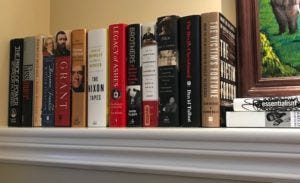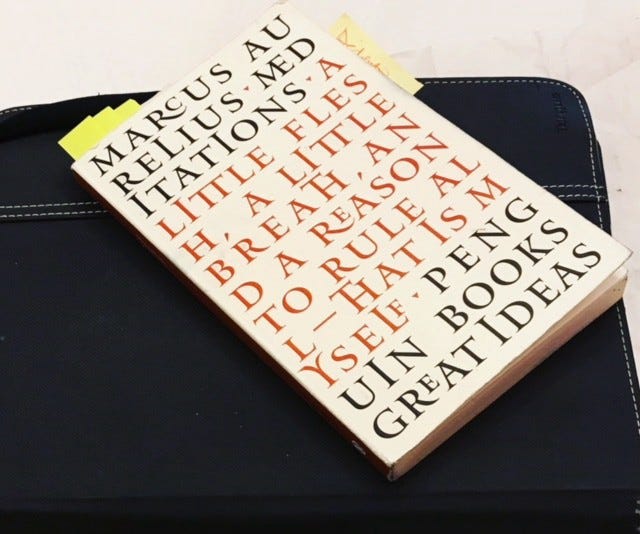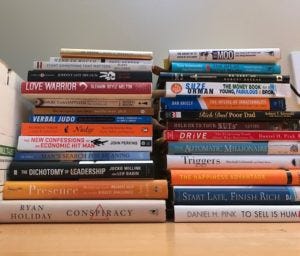Why Now is a Good Time to Build Your Antilibrary
As of this writing, the majority of the world is in isolation due to the COVID-19 virus which is sweeping across each continent. This has…

As of this writing, the majority of the world is in isolation due to the COVID-19 virus which is sweeping across each continent. This has provided many a unique opportunity: there’s now time to catch up on things that have been put off. For the majority of people in isolation, there is no longer the time devoted to a commute, or to getting ready to go to work, or anything of that nature.
We’re left with extra time which gives us an opportunity to devote some of that spare time to things we have been procrastinating about.
As I discussed a few weeks ago in our Monday Meditation, it is up to us what we decide to do with our time. We can choose to make the most of it or we can choose to waste it. My plan was to catch up on some of the book notes I’d been putting off doing for months.
Here’s how far I’ve gotten over the last week and a half.
So what do we do with the extra time?
Why Build Your Own Antilibrary
In his best-selling book, Black Swan, Nassim Nicholas Taleb discusses the idea of an antilibrary and uses the writer Umberto Eco as his prime example for why one needs an antilibrary.
According to Taleb:
“The writer Umberto Eco belongs to that small class of scholars who are encyclopedic, insightful, and nondull. He is the owner of a large personal library (containing thirty thousand books), and separates visitors into two categories: those who react with “Wow! Signore professore dottore Eco, what a library you have. How many of these books have you read?” and the others-a very small minority-who get the point is that a private library is not an ego-boosting appendages but a research tool. The library should contain as much of what you do not know as your financial means … allow you to put there. You will accumulate more knowledge and more books as you grow older, and the growing number of unread books on the shelves will look at you menacingly. Indeed, the more you know, the larger the rows of unread books.”
There is no right or wrong way to start building your antilibrary, but it is important to start building one, regardless of whether or not you are a writer. An antilibrary is knowledge waiting to be discovered. It is there for when you don’t even know you need it.
The way to start building your antilibrary should start with you. Figuring out what topics interest you, or may interest you in the future, is where you should start.
For my antilibrary, it started with books on philosophy, psychology, and fiction, specifically, mystery novels. As time went on, I began to expand more into different forms of philosophy, sociology, self-help, and history.
Figuring out which topics interest you is the first step in forming the antilibrary of your dreams. Once you have the topic or subject matter you’re interested in, then the fun begins.
How To Build Your Antilibrary
Finding the sources to fuel your topics will help you to discover new and interesting authors as well as new and interesting books to add to your antilibrary. This can come from a Google search, people you know, podcasts you listen to, Amazon, or walking into a bookstore and looking at what the selection holds.
One of my favorite ways that I have used to build my antilibrary is through used bookstores. Either on the weekends or while I am traveling, I go out of my way to look for used bookstores. Not only can I find great deals on books, but it gets me to look through and view books I may not have thought about adding to my collection of future reads.
But how do I go about actually choosing the works I want to add and read to my antilibrary?
Here’s an example of how it works:
Recently, I have been reading more biographies than I have historically done. While looking through one of my bookstores, I came across a book of quotes by Thomas Jefferson, Thomas Jefferson: His Essential Wisdom, and I bought it.
A few weeks later, I was looking in my local Goodwill at their used book selection and found Thomas Jefferson: The Art of Power by Jon Meacham, in brand new hardback edition, for $3. I bought the book and it is now sitting on my shelf for me to read. Once I do read it, it will open up more avenues of wisdom I will want to explore. For example, there may be a quote in there that speaks about Abraham Lincoln or Benjamin Franklin that sparks my interest. I may flip to the bibliography in the back, find a book(s) dealing with that subject matter, and go buy those, or at least have them in my mind for when I am looking through used bookstores.
This is how knowledge on a subject is built. And this is how your antilibrary grows.
The more reading and exploring one does, the more their antilibrary grows in an effort to learn more about subjects that interest them.
Right now, whoever, we’re all stuck inside. But that doesn’t mean that we cannot continue to explore books or build our antilibrary. There are plenty of websites that sell books used for dirt cheap prices. Besides Amazon, one can look at Abe Books or even ShopGoodwill to find cheap reads.
You Don’t Need to Read the Books Right Away
Roughly seven years ago, I heard about the philosophy of Stoicism. At the time, Tim Ferriss and Ryan Holiday were just starting to discuss the topic and it hadn’t quite caught fire in Silicon Valley the way it has right now. The three books mentioned over and over by them were:
Meditations by Marcus Aurelius Letters from a Stoic by Seneca Discourses and Enchiridion by Epictetus
So a few years later when I was browsing a bookstore in a mall with my fiance, I found this copy of Marcus Aurelius’s Meditations.
I sat down as my fiance continued to shop and began reading Marcus Aurelius’s Meditations.
And after twenty minutes I stopped.
I read through Book I of Meditations, found it completely boring, and could not understand why anyone thought an old Roman Emperor going on about who helped him achieve success was interesting.
So, when we got home, I put the book on the shelf, and that is where it sat for the next two years, untouched.
Yes, that’s right, I bought Meditations, couldn’t get past the first book, and put the book down (to my detriment) for another two years.
But here’s the thing, Meditations was part of my antilibrary which was growing. It wasn’t until years later, when I was searching for answers to the adversities I was facing in my life, that I once again returned to reading Meditations. (Quick side note: Anyone who has yet to read Meditations, start reading Book II, and read Book I as the “final” book in Meditations).
This has happened time and time again for me where I will buy a book to add to my antilibrary because it interests me, and it will sit there for years before I pick it up. Usually when I do, it is because I am in need of the information the book may contain. I call this “luck” but really it is preparation by building a library of books on topics which interest me and which I can see myself turning to in the future.
I was recently taking notes from the book Option B: Facing Adversity, Building Resilience, and Finding Joy by Sheryl Sandberg and Adam Grant, when it dawned on me that I bought the book when it was first released in 2017 because I am interested in the topic of resilience and psychology, but I did not end up reading the book until late in 2018 when I was going through a rough time in my life. Because I had already purchased the book, I simply had to look through my shelf to see what book would best suit the situation and begin reading.
Books Every Antilibrary Should Have
Everyone’s antilibrary will be personal and based upon their own preference and interests. However, there are a few books I feel should be in everyone’s antilibrary as they are life changing works.
Meditations -Marcus Aurelius
The book that truly started my journey into Stoicism years ago. This book is one I go to most often, and is the perfect example of a “mental gym.” Marcus’s words ring just as true today as when they were written nearly 2,000 years ago. As one reads through his personal thoughts, you’re immediately faced with the realization that even a man of his magnitude dealt with anger, jealousy, resentment, backstabbing, and more.
Man’s Search for Meaning — Viktor Frankl
Frankl’s book is perhaps one of the most known, selling millions of copies worldwide. His tale of his own experiences in Nazi holocaust concentration camps, and his eventually freedom from them, shows what humans can, and will do to survive.
Of books on Stoicism, I wish this one had been around when I first started studying it. John’s prose are smooth and simple, providing the reader with an easy to understand overview of the basic tenets of the philosophy. The book is less than 100 pages but those pages are packed with a punch.
Relentless: From Good to great to Unstoppable — Tim Grover
He was the personal trainer for both Michael Jordan and Kobe Bryant. Need anything else be said? This book delves deep into what it means to devote yourself to a task, craft, or sport and give everything you’ve got. Want to be great? Read this.
Creativity Inc.: Overcoming the Unseen Forces that Stand in the Way of True Inspiration — Ed Catmull
Catmull who helped build Pixar into what it is today does a great job of detailing what it takes to build a business culture and a sustainable company. The stories about how our favorite Pixar stories were made is enough to get anyone to buy this book.
Conclusion
As I discussed in one of our Monday Meditations, this time can be taken one of two ways: We can can choose to make the most of our time in isolation or we can waste it. And while I have been steadily working through my books, collecting the notes I have been putting off, I am not yet close to being done — I’ve got at least 30 more to go. But I am making the most of my time.
In order to build your antilibrary, may have to spend a little bit of money, but this is an ongoing project, what you get out of it is worth the money and more.
Looking for recommendations on your antilibrary? Email us.
PS: If you liked this article and would like to read more of my content, please feel free to sign-up for my monthly newsletter here.
PPS: This article contains affiliate links to the books I referenced. This being said, I have read and evaluated each of the books prior to my recommending them through the links within this article.
Originally published at https://stoicwithin.com on April 3, 2020.









